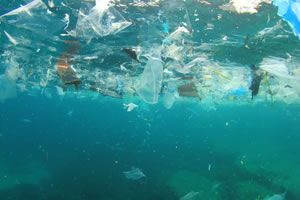A Resolution on marine litter and microplastics, passed this month at a major UN environment conference in Nairobi, was widely welcomed by campaigners and media. Not without cause it's strongly worded, to the point, and even specifies an action deadline of 2025 to "prevent and significantly reduce marine pollution of all kinds, in particular from land-based activities, including marine debris and nutrient pollution".
If all the countries that backed the Resolution did what it said, the problem of marine plastic would be mostly solved. But they won't. For a start, it's not legally binding (reportedly due to pressure from the US, China and India. It 'urges', 'encourages', 'requests' and 'invites' UN member states; it does not require, demand or compel. And even if it were legally binding, there's no guarantee that countries would do much about it anyway.
How can we be so sure?
Because as it happens, a substantial body of international law already forbids ocean plastic pollution and other forms of marine litter. And there's precious little sign of widespread compliance.
Working for the environmental charity Artists Project Earth with a view to taking forward a campaign for a new international treaty on marine litter including ocean plastic, I have reviewed the numerous existing international conventions and other legal instruments that apply to it (read my report here).
What I found was that countries that allow plastic wastes to enter the marine environment are already violating many laws with apparent impunity. For example Article 194 of UNCLOS, the United Nations Convention on the Law of the Sea, requires states to:
"prevent, reduce and control pollution of the marine environment from any source, using for this purpose the best practicable means at their disposal and in accordance with their capabilities ... measures shall include, inter alia, those designed to minimize to the fullest possible extent ... the release of toxic, harmful or noxious substances, especially those which are persistent, from land-based sources, from or through the atmosphere or by dumping [and] shall include those necessary to protect and preserve rare or fragile ecosystems as well as the habitat of depleted, threatened or endangered species and other forms of marine life."
The London Convention (on waste dumping in the seas and oceans) contains similar provisions. The Basel Convention, which governs the transboundary movement of wastes, may also be called into action to prevent one state allowing its plastic litter reaching the shores or waters of another state, by the simple expedient of declaring plastic litter as 'hazardous' in its domestic legislation. As far as I am aware, none has taken this simple step.
There are also numerous regional marine environment treaties, such as the North Atlantic (OSPAR Convention), the Mediterranean (Barcelona Convention), the Baltic (Helsinki Convention), the Black Sea (Bucharest Convention), the Caribbean (Cartagena Convention), some of which are contain very strong provisions applying to marine pollution. The Barcelona Convention is notable in having specific provisions for marine litter, defined as "any persistent, manufactured or processed solid material discarded, disposed of or abandoned in the marine and coastal environment."
Among the timetabled actions required of its member states is "By the year 2017 explore and implement to the extent possible prevention measures related to ... Extended Producer Responsibility strategy by making the producers, manufacturer brand owners and first importers responsible for the entire life-cycle of the product with measures prioritizing the hierarchy of waste management ... ".
But as we reach the end of the year, there is no sign of this obligation having been effected. The same goes for the many other binding legal responsibilities to control marine pollution that countries have assumed.
It's therefore clear is that the world's marine plastic problem will not be solved by this recent Resolution, nor its accompanying Ministerial Declaration calling for a pollution-free planet.
The need is not for more laws, treaties, conventions, resolutions and declarations, but more enforcement of the laws we already have in international courts and tribunals.
But that's hard. There is no official police force or prosecution service for international law. Nor do members of the public, campaigners or NGOs have any formal power to uphold it. That is left to countries that are parties to a treaty, who alone have the power to raise disputes against offenders against the terms of that treaty, and seek appropriate remedies. And it's something that for diplomatic, political and financial reasons, few choose to do.
So it is ultimately up to civil society - ordinary people, campaigners, NGOs and others - to invoke the moral power of international law, and thus shame governments into honouring their legal obligations to care for our oceans; to persuade ecologically progressive states to pursue legal avenues to force the worst offenders into compliance; and for us all to support their efforts in doing do so.
More information, including a copy of the report 'International Law and Marine Plastic Pollution: Holding Offenders Accountable' is available on the APE-UK website. This article was originally published by Lush Cosmetics: uk.lush.com








